AN ACTIVIST UNLEASHES HIS POWER
The new documentary Vito, premiering this week on HBO, tells the story of film historian, author and activist Vito Russo, who lived from 1946 to 1991. On the surface, Russo’s fascinating story may appear to be about gay rights, but his fiery and all-too-brief existence was bookended by the conclusion of both WWII and The Cold War. As such, his life encompassed the post-war boom and its unstoppable growth; the sexual revolution and its conservative backlash; idealists and their assassins; and a plague that left a cultural void in its wake. No doubt Vito acts as a historical primer about gays in America, as Jeffrey Schwarz’ doc tells the twentieth century tale of all things homosexual’”sexual, cultural, and psychological. The filmmaker also elucidates the sociopolitical climate that propelled the modern gay rights movement’”a restrictive atmosphere which will no doubt shock a younger gay audience born of a more permissive society’”but Vito is also fascinating viewing for anyone interested in American history.
Russo’s story mirrors the yarns of many inspiring American heroes, especially those who existed in an era that was a tinderbox for a conflagration of social change: his oppression led to outrage, which led to action, which led to a new birth of freedom. In many ways, Vito Russo was to gay rights what Thomas Paine was to the American Revolution. And as with Paine, Russo had a lot of common sense to disseminate to his community and worlds beyond.
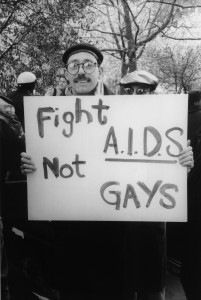 The most important element of any great doc is the story, one that will inform, evoke, and educate. In this arena, Schwarz succeeds triumphantly where many documents fail. The producer/director constructed an account that is rich in clarity, utilizing a wealth of archival footage and photos, many of which belong to the New York Public Library. The inexhaustible material was researched and cleared by Jon Glover, main researcher Nic Weinstein was assisted by Stephen Altobello, Adam Keleman, and June Schwarz, and all the material was painstakingly edited by Philip Harrison.
The most important element of any great doc is the story, one that will inform, evoke, and educate. In this arena, Schwarz succeeds triumphantly where many documents fail. The producer/director constructed an account that is rich in clarity, utilizing a wealth of archival footage and photos, many of which belong to the New York Public Library. The inexhaustible material was researched and cleared by Jon Glover, main researcher Nic Weinstein was assisted by Stephen Altobello, Adam Keleman, and June Schwarz, and all the material was painstakingly edited by Philip Harrison.
However, Vito breaks no new ground in the art of documentary filmmaking. In fact, as Talking Heads/Archival Footage documentaries go, the average American Experience on PBS is as good, if not better. The movie starts off slow, and because of the abrupt ending chronicling Russo’s death from AIDS, we are left not inspired but somewhat depressed and mildly enervated. It’s straightforward narrative includes some calculating music (original score by Miriam Cutler), and the interviews are shot with unexciting framework and backgrounds (director of photography David Quantic).
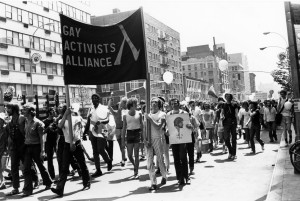 The cutaways (brief shots) from interviewee to archival matter was thoroughly efficient, but sometimes the interviewees themselves were often used in service to the story, when proper establishing cutaways would have had them treated as part of the story, which would have made the film more emotionally resonant. (For an example of emotionally gut-wrenching cutaways from interviewee to archival footage, see the 1984 The Times of Harvey Milk by Rob Epstein and Jeffrey Friedman, both of whom were also responsible for filming many of the Russo interviews seen in Vito, recorded for their other doc, Common Threads: Stories From The Quilt.)
The cutaways (brief shots) from interviewee to archival matter was thoroughly efficient, but sometimes the interviewees themselves were often used in service to the story, when proper establishing cutaways would have had them treated as part of the story, which would have made the film more emotionally resonant. (For an example of emotionally gut-wrenching cutaways from interviewee to archival footage, see the 1984 The Times of Harvey Milk by Rob Epstein and Jeffrey Friedman, both of whom were also responsible for filming many of the Russo interviews seen in Vito, recorded for their other doc, Common Threads: Stories From The Quilt.)
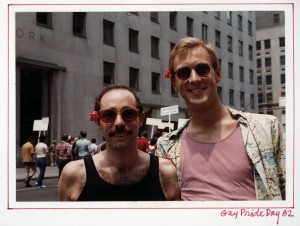 However, for such an involved, extremely notable and serendipitous life story, it’s amazing how much ground Schwarz covers without overwhelming us. Russo was the Zelig, Forrest Gump, and Samuel Pepys of gay activism. That one man was involved in most major flashpoints in the struggle for gay rights is mind-boggling to conceive. There he is sitting in a tree watching the Stonewall rebellion (a riot in which mostly transgender men fought back against police raids in bars); there he is as an original member of GAA, the Gay Activist’s Alliance; there he is writing, producing, and co-hosting Our Time, a public television series focusing on the gay community; there he is shedding light on the images of gays and lesbians in cinematic history, offering insightful interpretations in both lectures and the groundbreaking book “The Celluloid Closet” (a 1995 posthumous documentary of the same name was also produced by HBO); there he is founding GLAAD, a watchdog media group; there he is as cofounder of the AIDS protest organization ACT UP; and, believe it or not, there’s more.
However, for such an involved, extremely notable and serendipitous life story, it’s amazing how much ground Schwarz covers without overwhelming us. Russo was the Zelig, Forrest Gump, and Samuel Pepys of gay activism. That one man was involved in most major flashpoints in the struggle for gay rights is mind-boggling to conceive. There he is sitting in a tree watching the Stonewall rebellion (a riot in which mostly transgender men fought back against police raids in bars); there he is as an original member of GAA, the Gay Activist’s Alliance; there he is writing, producing, and co-hosting Our Time, a public television series focusing on the gay community; there he is shedding light on the images of gays and lesbians in cinematic history, offering insightful interpretations in both lectures and the groundbreaking book “The Celluloid Closet” (a 1995 posthumous documentary of the same name was also produced by HBO); there he is founding GLAAD, a watchdog media group; there he is as cofounder of the AIDS protest organization ACT UP; and, believe it or not, there’s more.
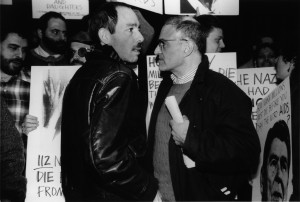 Russo deserves to be celebrated and HBO commended for sponsoring the film. Vito gloriously captures Russo’s spirit, his humor, his unapologetic self-acceptance, and his unflagging determination in bucking the system. Russo was born of a time when gay men were forced to go underground in their search for sex and love; interviewee Hal Offen, a member of GAA, instructs viewers that up until the Stonewall riots, “raids on gay bars happened all the time; people would get beaten up and carried away, and their lives would be ruined; they’d be humiliated and would not fight back and that was the end of it.”
Russo deserves to be celebrated and HBO commended for sponsoring the film. Vito gloriously captures Russo’s spirit, his humor, his unapologetic self-acceptance, and his unflagging determination in bucking the system. Russo was born of a time when gay men were forced to go underground in their search for sex and love; interviewee Hal Offen, a member of GAA, instructs viewers that up until the Stonewall riots, “raids on gay bars happened all the time; people would get beaten up and carried away, and their lives would be ruined; they’d be humiliated and would not fight back and that was the end of it.”
For millions in the LGBT community, Vito Russo made sure that shame and disgrace would not be the end. People benefit today from his efforts because Russo was always at the beginning.
Vito
Presented by HBO Documentary Films
debuts this week exclusively on HBO
playdates: July 26 (4:00 p.m., 12:50 a.m.), 29 (8:30 a.m., 5:10 a.m.), 31 (12:45 p.m.), and Aug. 4 (3:00 p.m.) and 8 (9:15 a.m.)
HBO2 playdates: July 25 (8:00 p.m.), Aug. 12 (11:45 a.m.) and 17 (2:30 p.m.)
also available on HBO On Demand and HBO GO
for info, visit http://vitorussomovie.com/
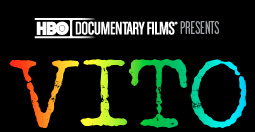
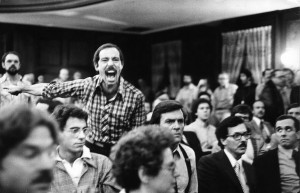

{ 1 comment… read it below or add one }
I have read many reviews about “Vito,” and this is so right on the money! The kind of writing that would make Vito proud. Thank you on behalf of the Russo Family. With respect, Charlie